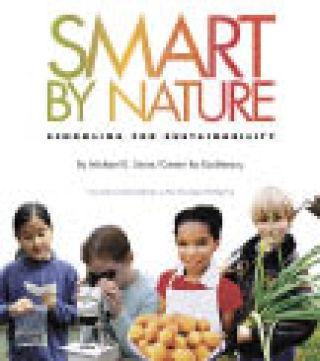Smart by Nature: Schooling for Sustainability by Michael K. Stone/Center for Ecoliteracy (Watershed Media / University of California Press, September 2009) offers firsthand accounts and strategies for greening campuses, rethinking school food, and transforming schools into model sustainable communities. And Lopez High School is featured as well as one of the case studies, under the “It’s Lunchtime at School: What in Health is Going On Here?”
Stone documents this movement through inspiring success stories from public and independent schools across the country. Youngsters learn good nutrition while eating healthy lunches of farm-fresh food, gardens bloom on former asphalt lots, and classroom buildings become living laboratories for resource conservation.
Students learn to ask what is upstream and who is downstream, and how their decisions affect the health of people and the environment. They design rain gardens, dig the trenches, direct the bulldozers, and reconcile competing opinions along the way. When students become engaged in studies that matter, test scores rise. Student health improves. Problem schools mired in low achievement become nationally recognized success stories.
“Smart by Nature” is a framework for schooling for sustainability based on two decades of work with hundreds of schools by the Center for Ecoliteracy, a public foundation in Berkeley, California. The book explores four areas of schooling for sustainability: food, the campus, community, and teaching & learning, examining each area from the perspective of Smart by Nature principles. For instance, it chronicles programs that look at whole food systems rather than just the nutrients in the lunch, and reports on how building greener schools saves money while benefiting the wider community.
One biology teacher explains, “It’s not so much that we want them to say ‘Oh we had a cool school. We put solar panels on the roof. We had a garden and we composted.’ But rather we want them to be able to express why they did those things and why they’re important.”
Smart by Nature includes profiles of schools and districts from every region, paying particular attention to strategies for creating change within schools and incorporating into the curriculum such sustainable practices as purchasing school food locally, increasing energy efficiency, and promoting the well-being of surrounding communities.



